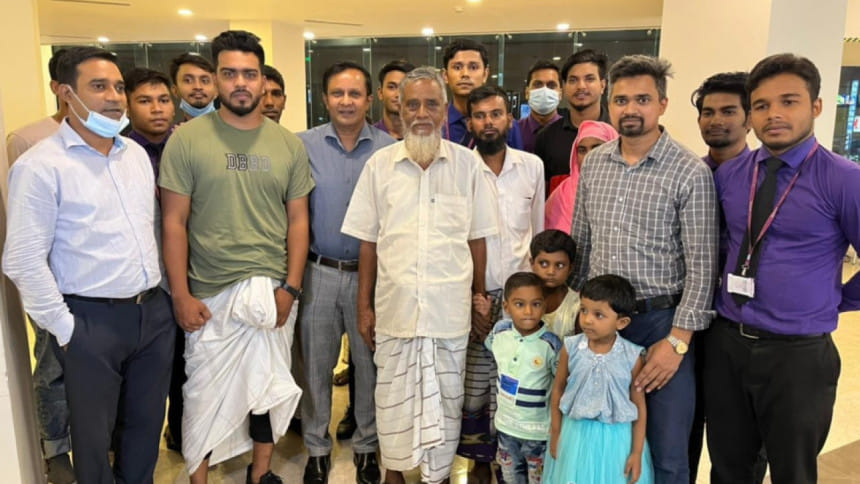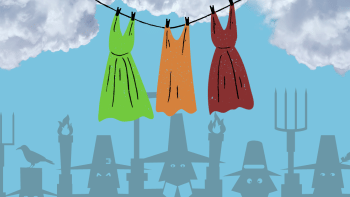STAR Cineplex and the lungi-clad customer

A viral video on Facebook earlier this week showed a very gentle-natured elderly man in a half-sleeved, plain white shirt and a grey lungi at STAR Cineplex, telling the person filming the video that he wasn't sold a ticket because he was wearing a lungi. Without so much as even a slight frown, he said that since they won't sell him a ticket, he can't watch the film he had come to watch – the newly released "Poran." The public was outraged, and rightfully so. STAR Cineplex released a statement claiming that it was all a result of "misunderstanding" and that the company "does not discriminate against anything, least of all a person's attire." They invited the man and his family to a free viewing of the film, posted photos, along with a caption that roughly translates to: "On behalf of the entire STAR Cineplex family, our respect and best wishes go out to Saman Ali Sarkar and his family. We are glad that we were able to make you happy."
Now, let's think about attire for a moment – from a post-colonial perspective. The lungi, a national garment that is worn by men of this subcontinent and elsewhere, is often seen as being too "third-class." It has come to represent the working class and even when men from the higher strata of the society wear it, given how comfortable it is, they do so behind closed doors, in the privacy of their own homes, lest it tarnishes the very image of the shaheb's status. Speaking of the brown shaheb, one must address the fact that these sartorial distinctions that make a certain garment unacceptable are a result of colonisation and the colonised mindset that is yet to unlearn the European standards of "civility" when it comes to dressing.
If you're familiar with Professor Kaiser Haq's "Ode on the Lungi," you will know how he glorifies the garment that has become the object of loathing (or rather, disgust) to many, but you will also see how he points out that "'All clothes have equal rights' –/ this nobody will deny/ and yet, some obviously/ are more equal than others." This, of course, is in reference to a quotation from George Orwell's allegorical novel, Animal Farm: "All animals are equal, but some animals are more equal than others" – a paradoxical and manipulative "commandment" made up by the dictatorial pigs on the totalitarian farm; a so-called mandate which basically means that, although all members of the farm appear to be equal, in reality, some have more rights than others.
So, although many people in the Bangladeshi society may not say a word against a widely-worn garment publicly, in fear of being classified as classist or anti-nationalist, this kind of discrimination against the lungi clearly shows that European clothing is "more equal" than Bengali attire. In fact, to cite another example, the original way of wearing the saree in pre-partition Bengal was to do so without a blouse or a petticoat (note how the very names of these two pieces of clothing worn with a saree are English words). But a hangover from the British Raj disallowed the women of this subcontinent from giving up on European standards of "modesty." Despite the departure of the colonists in 1947, cultural imperialism and cultural hegemony have played a major role in shaping the minds of any and all that have access to Western media, barring them from decolonising their minds. Looking and behaving Western is a matter of pride.
STAR Cineplex's act of benevolence confirms the power distance between the capitalist private company and the lungi-clad customer. Social media users' acceptance and recognition of this benevolence mirrors the Empire's South Asian apologists who were/are grateful for the "gifts" bestowed upon them by the British, such as the railway.
Gifting tickets to Saman Ali Sarkar and his family is not enough. A strong apology, without resorting to excuses such as "misunderstanding," and taking full responsibility for the sickening elitist move in not selling him the ticket that he had the money to pay for, as well a strongly-worded promise to never turn away another lungi-clad customer would make me, personally, feel pacified.
Noora Shamsi Bahar is a writer and translator, and a senior lecturer at the Department of English and Modern Languages in North South University (NSU).

 For all latest news, follow The Daily Star's Google News channel.
For all latest news, follow The Daily Star's Google News channel. 







Comments